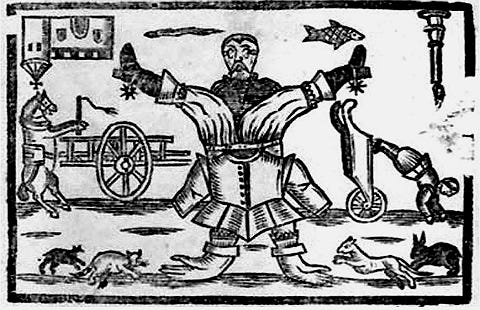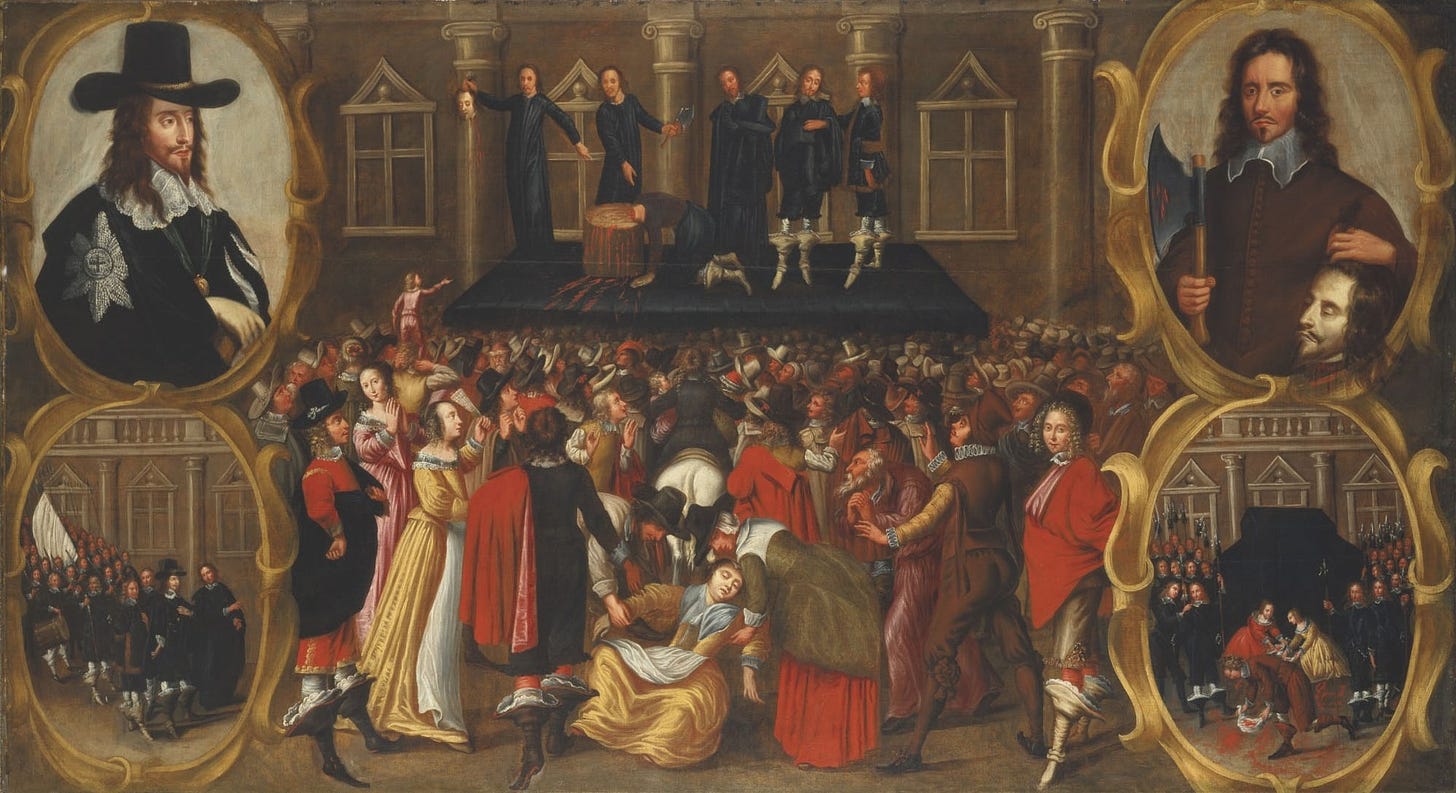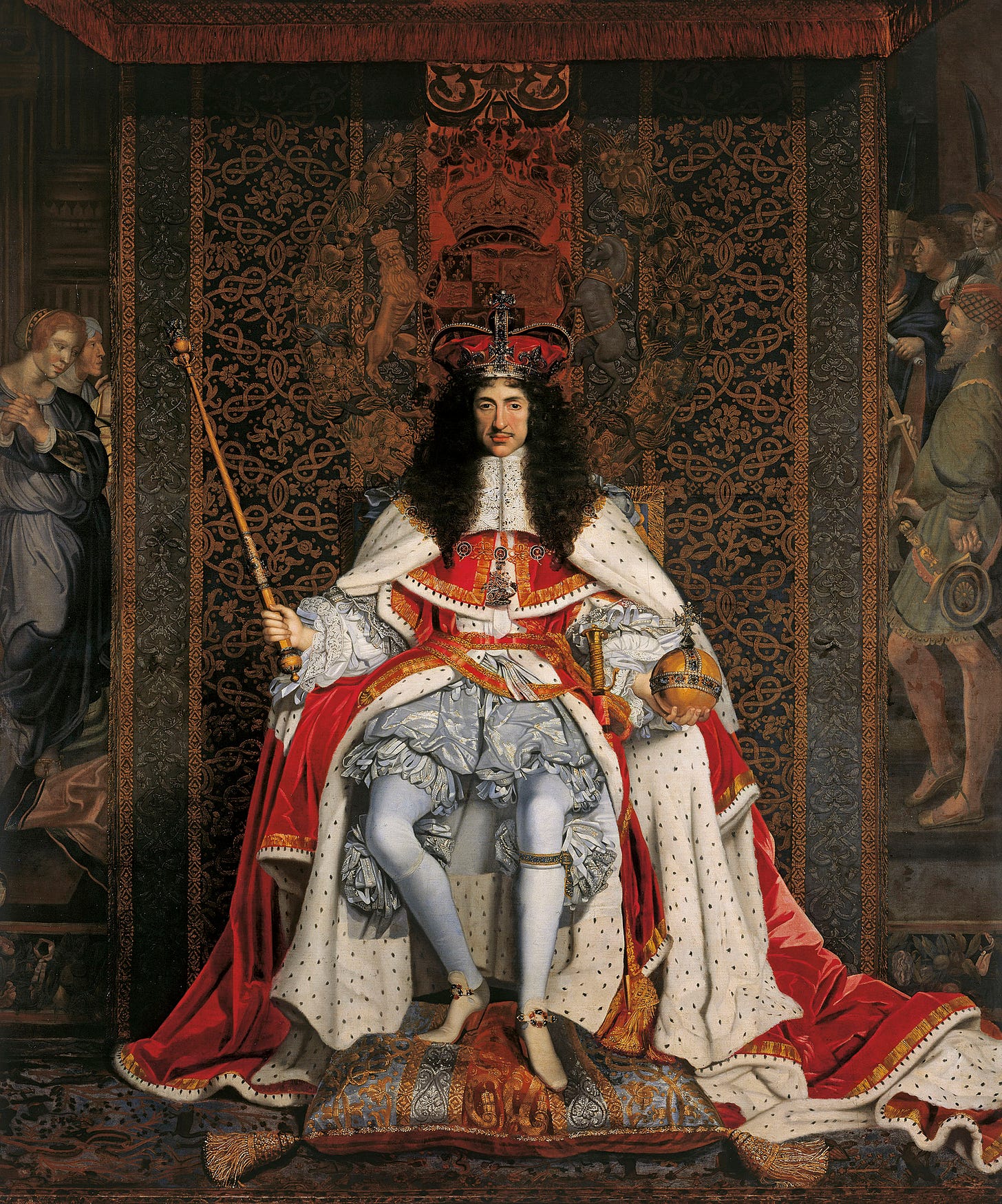There is a famous quote included in nearly every history of the English Civil Wars. It’s from the excellently named and austere-countenanced parliamentarian Bulstrode Whitelocke, and appears to have been uttered in 1642, at the advent of military hostilities between King Charles I and his parliament: “It is strange to note how insensibly we have slipped into this beginning of a civil war by one unexpected accident after another, as waves of the sea which have brought us this far and which we scarce know how.”
By then, the armies were already on the march, towards a series of brutal conflicts and massacres, towards a regicide, a brief, strange Commonwealth, and finally, after decades of bloody interregnum, a resumption of the monarchy in all its pomp, the Crown Jewels that had been sold for arms restored in replica, and Charles II enthroned clad in red and ermine. Still: it was a wild hour, a time when the sovereign power overreached itself and was broken from below, a time when illegitimate authority met the great forces of resistance. A time useful to study, now.
From this distance in time, and through the poor lenses of popular histories and doctrinaire ones, the Civil Wars seem an impenetrable tangle. It was a conflict that convulsed the three kingdoms of England, Scotland and Ireland, gave rise to a great torrent of religious upheaval, saw the execution of mighty archbishops, and the ennoblement of the common soldiery. Religion and politics—the creeds of puritan and papist, Anabaptist and Independent, Anglican, parliamentarian, royalist, Roundhead, Cavalier—are premodern in their forms, and come to us through the memoirs of the gentry and the scanty runes of judicial records. But when considering the current ferment of my own country, I thought of Whitelocke’s words—the way civil conflict encroaches like a sea, with its own tides and currents, over years and decades, until it is suddenly come to fullness, making corpses as it goes.
As to why my mind is filled with the black seas of civil unrest, one need only look to the streets. Of course we have had our own Civil War on this side of the ocean, though it lasted four years instead of forty. But in many ways the English Civil War was its antecedent, not least because of the legions of the poor and the pious who fled its depredations across the Atlantic to the new colonies in the new world, and imbued a nascent nation with their millenarian fervor. England then was a society in a welter of change and economic tumult, riven by martial faith and a new proliferation of information, in which the legitimacy of authority itself came into sudden and all-consuming doubt: the strange seventeenth century is our own distant mirror.
When authority collapses—when it compromises its own legitimacy through the abrogation of rights dearly held—what replaces it? A king is his own particular case, lent succor by his proximity to the divine, but even a tripartite republican government can claim its own sacrality: it was not so long after the English wars that our present American system was conceived, and it has been hallowed by millions, placed at the center of a civic cult fervent as any presbyter’s faith. 1649, Whitehall, the solemn executioner holds up the dripping head: a regicide echoes down the centuries as the death of no ordinary man can—a single, obdurate, long-nosed Stuart monarch, neck bleeding on the block, is remembered in every detail, whereas the men and women who died in their thousands in Drogheda and Naseby, on Marston Moor and in the shires of the three kingdoms, passed into obscurity as soon as they were swallowed by the grave.
A regicide leaves the broadest chasm, an empty hollow, as of an outstretched palm: the great man invested with absolute authority by God and man, in dying, leaves the mouth of the Leviathan open for a great inrush of the new. As Christopher Hill notes in The World Turned Upside Down, his extraordinary history of the Civil Wars from the viewpoint of the lower classes, many of the gentry feared the wars precisely because they inevitably ensnared and emboldened the great mass of the common people—who were armed, and taxed, and imbued with ideological and spiritual fervor unmatched in English history to that time. There were many—carters, bakers, weavers, butchers, fishwives, fullers, and the pious and disciplined ranks of Cromwell’s New Model Army, who dreamed of an England where every man born, and woman too, ought to be given property and franchise by virtue of their humanity alone. When a king is killed the world breaks open like an egg, and from the cracked shell flows a world of violent possibility.
The Sword and the Sandwich is a newsletter about serious extremism and equally serious sandwiches. Please consider supporting this work with a paid subscription:
The history of the Civil Wars as they are commonly written involves an ungracious, crotchety dance between an autocratic king desirous of funding for his wars and his household, and the parliamentarians, a mix of puritans and plutocrats, who sought redress of their rights and emendation of unjust taxation before granting the monarch his stipend. Parliaments were called and dissolved; declarations made, and the most daring speechifiers imprisoned in the Tower of London; Charles sought to outfox parliament by obtaining capital through other means; finally it came to an attempt by the King to arrest his chief parliamentary foes, only to find that they had slipped out of his grasp, forewarned. And so the conflict began in earnest. Intermingled in all this was an undercurrent of intra-Protestant animus—chiefly that the King and his Anglican archbishop hewed too closely to the Catholic traditions of pomp and ritual, and that Charles was unduly influenced by his Catholic wife, Henrietta Maria of France.
The story is not a stirring or morally simple one—there are as many earls and dukes as commoners, and while parliament may have had more merchants, lawyers and men of letters than the privy councils of prior centuries, it was hardly a democratic gathering of the masses. As John Buchan described the parliamentarians in his biography of Oliver Cromwell, “They were a ruling class, not a caste, and therefore they were realist and not romantic; they might oppose the king, but it would not be for the sake of the people, for they had little concern with whimsies about popular rights.” Nonetheless—as uninspiring as they might be as the standard-bearers of popular revolution, concerned as they were with their private fortunes or doctrinal dogmas—what happened in 1642 was a cataclysm no less abyssal than any French or American revolution. In taking up arms against their monarch, the parliamentarians dared to find fault with the absolutism of autocracy; in challenging the divine right of the king, they tore at the fabric of their cosmos. In cutting off his head, they snuffed out one sun and left room in the firmament for a new and stranger star.
If the conflict ended with an odd timidity—the prodigal return of the crown prince, Charles II, escorted by the ranks of the New Model Army that had bitterly fought the royalist host; his coronation in the very hall where his father had been executed—it also marked the close of a wild riot of ideas that had coursed through the isles on a sea of pamphlets and speeches uncensored by church or crown. This was the century when the Quaker sect was founded, and Baptists too. And the same fishwives and fletchers became Ranters and Seekers, Diggers and Levellers—dedicated to the creation of a better world within the confines of the earth. The Diggers claimed the vast tracts of crown land for the common man, and in the strange brief candle of their belief created an agrarian communism that oppressed none but the gentry’s stags. They were ruthlessly routed, but their founder Gerrard Winstanley’s words echo down sweetly and simply over the centuries:
“In the beginning of Time, the great Creator Reason, made the Earth to be a Common Treasury, to preserve Beasts, Birds, Fishes, and Man, the lord that was to govern this Creation; for Man had Domination given to him, over the Beasts, Birds, and Fishes; but not one word was spoken in the beginning, That one branch of mankind should rule over another. And the Reason is this, Every single man, Male and Female, is a perfect Creature of himself; and the same Spirit that made the Globe, dwels in man…”
These were revolutionary ideas in their time; even in ours, they are far from fruition. In the last week the judgment came—the end of Roe v. Wade—that stripped inalienable rights from bodies that cannot afford their loss. The “common treasury of the earth” finds its coffers dwindling. The bad grandees preen and offer platitudes; mad zealots beleaguer the people; and plague still lies on the land. Winstanley said: “The law is the fox, poor men are the geese; he pulls off their feathers and feeds upon them.” An Aesop’s fable in perfect miniature. And true to his word, at this moment we are encouraged to do nothing more than coo and mill like fowl, accomplices in our own abasement. He also said: “For what you call the Law is but a club of the rich over the lowest of men, sanctifying the conquest of the earth by a few and making their theft the way of things.”
Every day we make the choice between the red rout of rebellion and piecemeal slaughter under the color of law. Nearly four hundred years ago the cavalry rode out, and some died, and some were saved, and some killed a king. In his absence arose a charivari, the heavy beat of the rough music, the wild dreams of the common weal. In order to kill the king in fact you have to first kill the king in your heart: kill your own servility, your own obeisance, the part of you that cringes and seeks to wait, and to be led. There are perhaps still wilder shores and redder tides to reach before all order breaks, but it behooves us to be ready, to unbend our knees at last. He said: “For freedom is the man who will turn the world upside down, therefore no wonder he hath enemies.”









I was really excited to see the phrase "World turned Upside Down" in my inbox today. Last year I read a collection Winstanely's writings and some histories of the Commons and ever since have found myself likewise thinking of this tumultuous period and today.
Just got around to reading this--wonderful. I've always loved the song by the same name, sung first I think by the incomparable Dick Gaughan: https://www.youtube.com/watch?v=XWzzvnPOyTM. Gives me goosebumps every time I hear it.